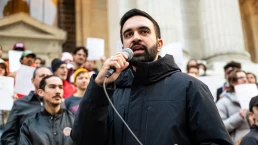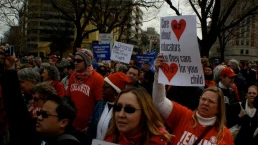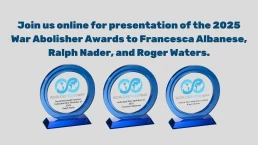A conversation with Maggie Levantovskaya, a lecturer at a small Jesuit university, about how workers there formed a union, despite the fact that the National Labor Relations Board does not have jurisdiction over religious institutions.
By Maximillian Alvarez, In These Times
Adjunct faculty and lecturers at Santa Clara University, a private Jesuit university in Silicon Valley, have been working to organize a non-tenure track (NTT) faculty union for five years. Along with navigating the particular challenges that come with worker organizing in higher education, theirs is a historic campaign because it is taking place at a religious institution, which the National Labor Relations Board does not exercise jurisdiction over. Nevertheless, after years of organizing and union busting, NTT faculty at Santa Clara are currently voting in their long-awaited union election. In this mini-cast, TRNN Editor-in-Chief Maximillian Alvarez reconnects with former Working People guest Maggie Levantovskaya to talk about why NTT faculty have fought so hard for so long to get to this point and why organizing your workplace — in higher ed and beyond — is so important. Levantovskaya is a lecturer in the English Department and member of AFLOC, the Adjunct Faculty and Lecturer Organizing Committee, at Santa Clara University.

Transcript
Maggie Levantovskaya: I’m Maggie Levantovskaya. I’m a lecturer in the English Department at Santa Clara University. I’m also one of the union organizers there. I’m on an organizing committee along with a bunch of other adjuncts and lecturers at Santa Clara.
Maximillian Alvarez: All right. Well, welcome everyone to another episode of Working People, a podcast about the lives, jobs, dreams, and struggles of the working class today. Brought to you in partnership with In These Times magazine and The Real News Network, produced by Jules Taylor, and made possible by the support of listeners like you.
So hello everyone. We’ve got a special and urgent mini cast for you all today with a familiar face, or a familiar voice, I guess I should say. You all may remember that we had a really incredible full-length episode with our guest today, Maggie Levantovskaya… When was that? Last season, at the beginning, or just before the beginning of season four. So it was technically part of season three. But it was a really awesome conversation where we got to talk more about Maggie’s backstory. We just went in all different directions, talking about her family history, leaving the Soviet Union, growing up in the United States in immigrant communities, working-class communities, growing up to be a literary scholar and an organizer in higher education.
So if you haven’t listened to that episode, if you aren’t following Maggie’s work, I would highly, highly recommend that you fix both of those. We’re going to link to that episode that we did with Maggie here in the show notes for you all. We’re also going to link to some of the great writing that Maggie’s been doing, particularly on this very important and undercovered union drive, as you heard Maggie said, over at Santa Clara University in California.
You guys know that we’ve been doing our best to cover the struggles going on in the academic labor movement, and there are many. Recently, we had striking student and grad student workers on the show from Indiana University and Kenyon college. Before that, we spoke to folks from Columbia University, graduate workers who were on strike. The academic labor movement, for obvious reasons, is very close to my heart, but it’s easy for us to sort of like… Those of us outside of academia now, it tends to get painted over as just like this singular thing. But anyone who knows anything about the landscape of higher education in the United States and beyond knows that it’s a very diverse landscape.
You’ve got private colleges, you’ve got public universities. You’ve got big universities, you’ve got small universities. You’ve got small liberal arts colleges in the middle of nowhere. You’ve got massive state schools in the middle of cities. You have religious institutions like Santa Clara University. Depending on the state, depending on the kind of institution that it is, depending on the kind of mission and charter that the university has, that can all have really big implications for workers at these institutions organizing.
This is what I really wanted to bring Maggie back on the show to walk us through. Because if you guys remember, when we had Maggie on the show last time, we talked about how she got involved in this historic, frankly, unionization effort of adjunct faculty and lecturers at Santa Clara, and how this has basically been a five-year-long struggle to get to where they are right now. And where they are right now is they’re actually voting, finally, in a union election. And, as we have been hearing, they have been facing a lot of union-busting crap from the university. It’s very tough to get to this point, and we know that. And so, we wanted to bring Maggie on to give us an update, walk us through what’s going on, let us know how listeners can show support.
So with all that upfront, Maggie, I wanted to toss it back to you and ask if you could basically pick up from where we left off during that last full-length interview. What’s been going on from then to now besides more years of pandemic and the world going to shit? What’s been going on over there at Santa Clara?
Maggie Levantovskaya: Yeah. So, first of all, thanks for having me. It’s really hard to actually get any press coverage for these kinds of, I guess, very localized labor struggles that don’t have some big, really dramatic thing happen, where workers go on a hunger strike or there’s a strike or some kind of another work stoppage that goes on for weeks and weeks. So I just really appreciate the fact that you’re having me on to even talk about this.
But a lot has happened. So actually the last time I talked to you, my colleagues and I didn’t know if we’d ever get to have a union election. Things were just really not promising at that moment. That’s because we couldn’t file for our election through the NLRB…
Recent Posts
Politicians Are Betraying Gen Z On Climate
July 10, 2025
Take Action Now While Gen-Zers thrift, knit, crochet, and find other ways to reduce our footprints, Trump and the GOP are greenlighting more climate…
Trump’s Deportation Threat Against Zohran Mamdani Is Shameful
July 10, 2025
Take Action Now In only half a year of Donald Trump’s presidency, he and his allies have turned deportation into an explicitly political threat…
Teachers Union Votes To Cut Ties To The Anti-Defamation League
July 10, 2025
Take Action Now In a momentous vote, the National Education Association voted to cut all ties with the Anti-Defamation League. The reason? “Despite…
2025 War Abolisher Awards Go To Albanese, Nader, Waters
July 9, 2025
Take Action Now The purpose of the awards is to honor and encourage support for those working to abolish the institution of war itself.By World…




